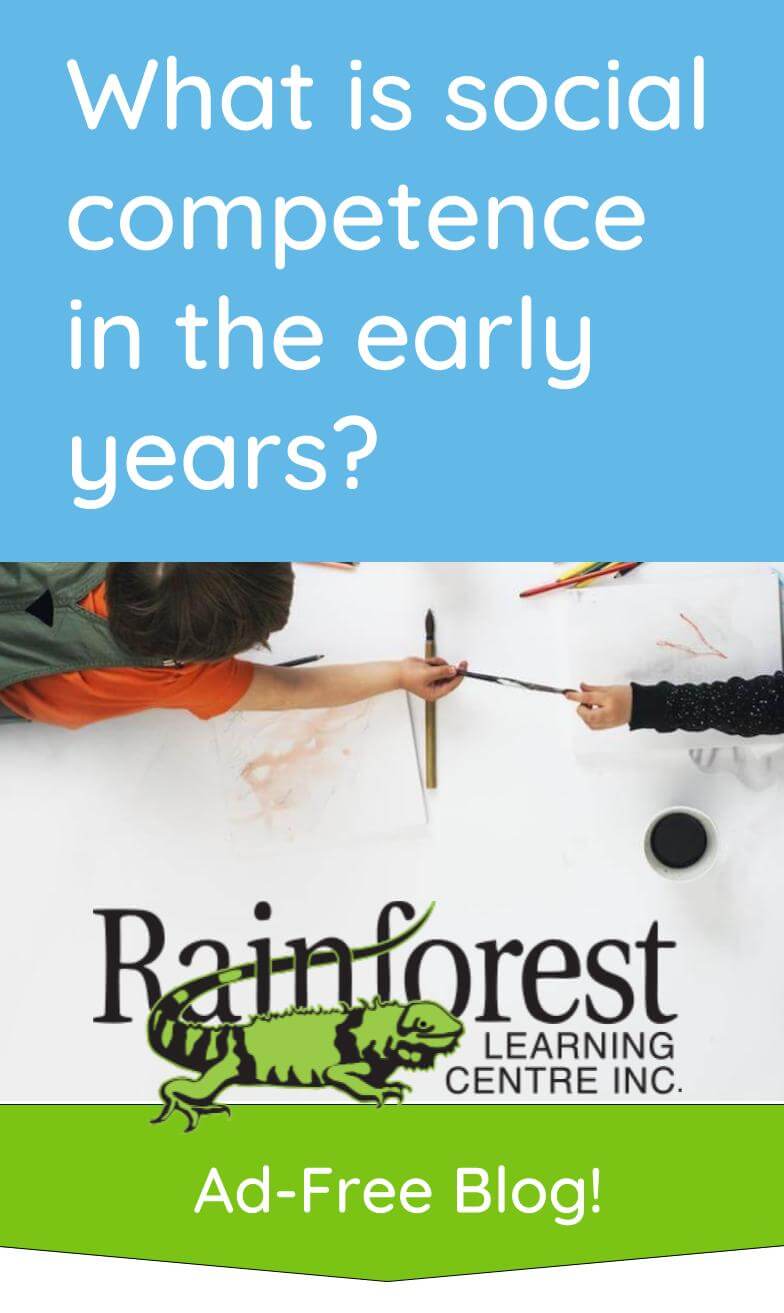
When your child sits in a play room at age 1, with other 1-year-olds, you may notice there isn’t a lot of interaction between them, other than to take toys from each other without much empathy. And that’s typical. Some parents refer to this as “parallel play.” However, as your child grows into a toddler, it becomes normal for them to interact with others as part of their play. But how well they do that is what we call social competence in the early years.
Social competence in the early years is the ability of children to understand their environment, gauge the wants and needs of others (in conjunction with their own), and then to adapt to those situations in an age-appropriate way – a way that healthily enhances their identity, and doesn’t stifle it. An oversimplified definition of social competence would be: being able to get along with others.
Under the same umbrella of social competence, you may also hear about emotional intelligence, interpersonal skills, self-awareness, self-confidence, social development, social skills and other related terms. These segments of social competence refer to various angles that indicate how well a child is developing psychologically, as it relates to their interactions with others.
Different kids may have differing degrees of social competence in the early years, and this can be further segmented by their age. You can get a glimpse of a child’s social abilities by observing their typical behaviour with others. Some signs of a lack of social competence in young children would be:
- Not being able to wait their turn.
- Not being able to share, or assuming ownership of objects that are not theirs.
- Inability to compromise or problem-solve in typical play-based scenarios.
- Throwing temper tantrums when they don’t get their way, or lose a game.
- Unwillingness to follow established rules of a game.
- Inability to include others in play.
- Lack of self confidence when presented with an opportunity for social engagement.
- Inability to play independently of their parents or caregivers.
- Inability to stand up for themselves without being aggressive or overly reactive.
- Falling too easily to the will of others, even when they don’t want to.
- Inability to articulate their feelings or control their expressions of strong emotions.
- An abnormal distrust of people (especially caregivers).
- Hitting, bullying and verbally aggressive behaviour.
- Lack of empathy for children around them who are hurt, physically or emotionally.
And more.
However, keep in mind that the early years are when children are developing a lot of their personality, plus psychological and physical abilities. These factors affect their interactions with others. So if your child has trouble with social competence at age 2, 3 or 4, it may not be something to be alarmed about just yet. But that is not to say it should be ignored, either. It simply implies that:
- Caregivers, including childcare providers, should be aware of the problem and work with parents to find solutions in due time.
- If the lack of social competence leans towards signs of disability, a doctor should be consulted. Sometimes, seeking the help of professionals is wise, to find the root cause of the problem. This is especially if common ‘coaching’ methods with the child don’t work, and problem behaviours persist.
With that said, there are other pointers to know about social competence, which we’ll discuss below.
Social competence in the early years takes practice
Generally speaking, kids aren’t born to be socially adept. It takes learning to understand that some behaviours are acceptable, and some aren’t. And, also generally speaking, this type of learning starts in the home environment, with a lot of affection from parents and caregivers. When disabilities are involved, the daily reactions of parents can have a bigger effect on a child’s social development.
But even when you have an ideal home situation, a child still needs to practice skills like sharing, making eye contact, articulating emotions, coping when they don’t get what they want, problem solving with other children, and so on.
That is why we do certain activities in daycare and preschool settings; it is to help kids get along with others by learning these life skills. For example, we may teach games that encourage making eye contact. Or, we may ask children to play games that involve partners and teams. And of course, there is ‘circle time’ where kids learn to sit quietly and listen to the teacher with everyone else in the room.
At home, you can also reinforce these messages, but then also take things a step further. For example, you can ask your child to talk about their feelings when they experience various emotions. Ask them why they are upset or happy, and try to get them to name their feelings (without making them feel guilty for having those feelings in the first place). The more they are aware of their own emotions, the easier they can be solved internally. And quite frankly, the quicker the child can ‘move on.’
See more on our blog:
Being shy or quiet is not the same as being socially incompetent, but it should never result in being intimidated
This is an important point to make. If your child is shy, and plays better in one-on-one situations than in groups, that’s ok. It just means they are finding friends with their same interests, and who share their quieter personalities.
So, don’t be alarmed if your child isn’t the most popular 3-year-old in daycare. If they can still make a few friends after a couple weeks, and feel comfortable, they are probably doing ok.
The time to be worried is if you notice your child being afraid of going to daycare, being insecure about themselves in a group or showing signs of being bullied. If you notice that happening, we’d encourage you to take two primary actions:
- Speak to your child regularly, as noted above. Ask them how their day went. Ask what they enjoyed or liked at daycare. Ask them about their friends. Ask them if anything made them upset or happy. You may need to probe young children to get the detail you want out of them. This is a healthy practice regardless of whether you see visible signs of bullying (in case your child internalizes and hides their feelings).
- Speak to those in charge at your daycare center or preschool. Bullying is usually unacceptable in most child care or preschool environments. A good early childhood educational team will use their skills to handle the situation with care and professionalism. Remember: the kid who is bullying your child may have other issues at home which are causing the problem behaviour. It’s no excuse, but it’s also not something that can be solved overnight. Your child’s well-being, regardless, should be top-of-mind for the child caregivers.
Social competence in the early years is as important as any other subject kids are taught
As we can see, while a child can learn facts and figures at school, it is equally important that they learn the life skills of social interaction and cooperation. Daycare and preschool are especially important places where children can learn social competence, since these environments act as precursors to grade school. When children start kindergarten, they will be in more and more socially-demanding situations. If a child doesn’t feel like they fit in, it can make learning their academic subjects hard. And so, it is every adult’s duty in a child’s life to be aware of, and encourage social competence in the early years.
See related on our blog:
- How to know if your child is emotionally ready for school
- 3 ways early childhood educators can help kids get along and feel included
- 3 ways to build self-awareness in early childhood
- 3 ways to build confidence in young children
- 3 Key tips to understand and solve temper tantrums in toddlers and young children
- Does your child need an occupational therapist? Here is what to know
- The importance of eye contact in young children, and how to teach it as a social skill
